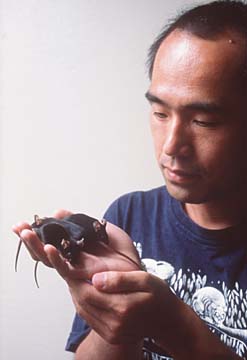

Mice-clone
team member
leaving UH
Teruhiko Wakayama will
By Helen Altonn
keep collaborating with
'Team Yana'
Star-BulletinThe lead researcher in the University of Hawaii's breakthrough male and female mouse cloning has accepted a job at Rockefeller University.
However, assistant professor Teruhiko Wakayama will continue to collaborate with the UH's famed "Team Yana."
Ryuzo Yanagimachi, UH professor of anatomy and reproductive biology who heads the team, said today there is much unfinished work and that Wakayama will be going back and forth between the two institutions.
"It's not the end of cooperation," Yanagimachi said. "Of course, over there is a better opportunity and a better offer."

Wakayama's departure leaves only Yanagimachi of the three key members of the team that made international news last year with the "Honolulu Technique" for cloning generations of mice.Anthony Perry, who was part of the team, filed a lawsuit against UH in July claiming title to intellectual property from some of the techniques. He remains on the payroll as an emergency hire.
Perry developed "Honolulu transgenesis," a method of transferring genetic information from one organism to another. The result: green mice from a jellyfish's green gene.
Alan H. Teramura, UH senior vice president for research, said Wakayama planned to leave today on a 10-day trip to Japan and indicated he'd like to go to Rockefeller soon after returning.
"Certainly, we're disappointed to learn that he's going to leave," Teramura said, "because even as late as several days ago, he expressed that he wanted to continue at the university."
But he said, "Yana is a very upbeat person" who is "on a mode of building his team up. He will just have to fill an additional position he didn't anticipate."
Laith Reynolds, who founded ProBio America Ltd. to market and commercialize Team Yana's research, suggested that Perry's lawsuit was one reason for Wakayama's departure.
He said Wakayama was "caught in the crossfire" between his colleague and the university and was "severely embarrassed" by the publicity.
But Wakayama would have had to leave eventually to obtain the facilities and equipment needed for his next level of research, Reynolds said.
He said funding to retain permanent researchers and provide them with needed equipment "is not really forthcoming."
An Institute of Biogenesis Research --which Reynolds said should be called "Yanagimachi Institute" -- is being built for the group on the Manoa campus through a $6 million public-private partnership.
The biogenesis institute is "one of the engines to drive the future of biotechnology in Hawaii," Reynolds said.
"But when it's finished, it will be empty," he said. "We need to see a concerted effort here in Hawaii to raise money, hopefully from company contributions, to see that it's equipped."
Unless that happens, Reynolds said, "there is no real basis for people like Teru (Wakayama) to stay on after they've gone through the excellent teaching process and instructional process with an eminent scientist like professor Yanagimachi."
After raising $5 million needed to equip the institute, Reynolds said about $10 million should be raised for a revolving fund to help pay the researchers.
"We could never outmatch huge mainland universities, but at least we can provide a significant level of funding for research from the fund."
Wakayama joined Yanagimachi on a two-year postdoctoral fellowship ending last October. He stayed on another year, "but problems around Tony have soured his life somewhat," Reynolds said.
Yanagimachi said he was surprised Wakayama stayed as long as he did because he has had many big offers from mainland universities. Yanagimachi is recruiting scientists for five new faculty positions and has "some good ones already."
But he said other universities can move quickly. "If they want someone, they do it the next day. There are too many rules here, too much bureaucracy. ... I want to fill up this space tomorrow, actually, but it will take six months or one year. In the meantime, other universities are grabbing. ...
"I myself stay here. I try to make this university stronger," Yanagimachi said. "I am working to make a better generation. It may be tough but it is challenging."
http://www.kaleo.org